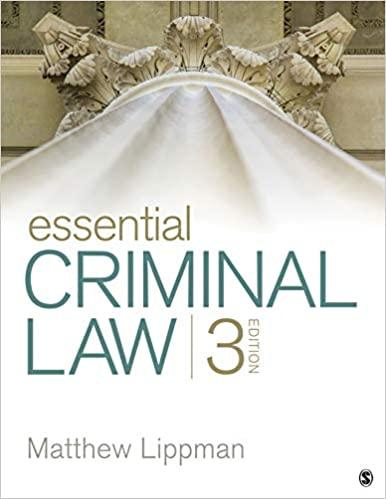Question
The Criminalization of American Business What do Bank of America, Citigroup, JPMorgan Chase, and Goldman Sachs have in common?All paid hefty fines for purportedly misleading
The Criminalization of American Business
What do Bank of America, Citigroup, JPMorgan Chase, and Goldman Sachs have in common?All paid hefty fines for purportedly misleading investors about mortgage-backed securities.In fact, these companies paid the government a total of $50 billion in fines.The payments were made in lieu of criminal prosecutions.
Today, several hundred thousand federal rules that apply to businesses carry some form of criminal penalty.That is in addition to more than four thousand federal laws, many of which carry criminal sanctions for their violation.From 2000 to 2019, about 3,200 corporations either were convicted or pleaded guilty to violating federal statutes or rules.
Criminal Convictions
The first successful criminal conviction in a federal court against a companythe New York Central and Hudson River Railroadwas upheld by the Supreme Court in 1909 (the violation: cutting prices).Many other successful convictions followed.
One landmark case developed theaggregation test, now called the Doctrine of Collective Knowledge.This test aggregates the omissions and acts of two or more persons in a corporation, thereby constructing anactus reusand amens reaout of the conduct and knowledge of several individuals.
Not all government attempts at applying criminal law to corporations survive.Courts have sometimes found insufficient evidence to show that a company acted with specific intent to commit a crime.Often, however, companies choose to reach settlement agreements with the government rather than fight criminal indictments.
Many Pay Substantial Fines in Lieu of Prosecution
More than four hundred corporations reached so-called non-prosecution agreements with the government from 2000 to the beginning of 2019.These agreements typically involve multimillion- or multibillion-dollar fines.This number does not include fines paid to the Environmental Protection Agency or to the Fish and Wildlife Service.
According to law professors Margaret Lemos and Max Minzner, "Public enforcers often seek large monetary awards for self-interested reasons divorced from the public interest and deterrents.The incentives are strongest when enforcement agencies are permitted to retain all or some of the proceeds of enforcement."
Questions Presented
- Why might a corporation's managers agree to pay a large fine rather than to be indicted and proceed to trial?
- How does a manager determine the optimal amount of legal research to undertake to prevent her or his company from violating the many thousands of federal regulations?
Step by Step Solution
There are 3 Steps involved in it
Step: 1

Get Instant Access to Expert-Tailored Solutions
See step-by-step solutions with expert insights and AI powered tools for academic success
Step: 2

Step: 3

Ace Your Homework with AI
Get the answers you need in no time with our AI-driven, step-by-step assistance
Get Started


